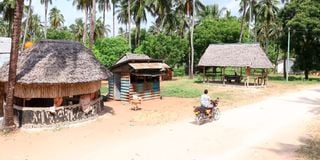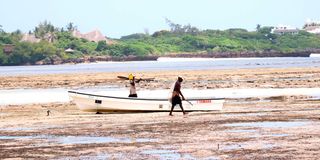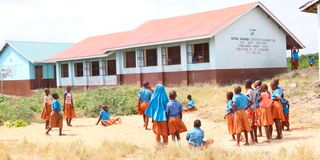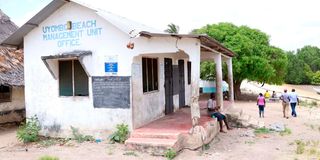
Uyombo shopping centre in Matsangoni, Kilifi County. The area has been earmarked as a potential site for a nuclear power plant, an idea opposed by residents.
In the remote area of Uyombo sub-location in Matsangoni Ward, Kilifi North Constituency, lies Uyombo village, earmarked for a proposed multi-billion shilling nuclear power plant.
The state, through the Nuclear Power and Energy Authority (Nupea), plans to build a Sh500 billion nuclear power plant to generate 1,000 megawatts by 2034. Construction is expected to begin in 2027.
In recent years, however, Nupea's plan to build a nuclear power plant in Kenya's coastal region has been met with mixed reactions.
On the one hand, supporters of the mega-project, which is still in the planning stages, consider it a milestone that will put Kenya ahead in terms of energy production.
On the other hand, its opponents are worried about the country's ability to control and prevent possible tragic incidents that could result from accidents in nuclear power generation.
The opponents include some residents of Uyombo village and civil society groups.
A dusty murram road leads into the village off the Kilifi-Malindi highway.
The many species of indigenous trees that alternate along the way with tracts of coconut farms give the area a cool microclimate, which for the Nation team was a much-needed break from the sweltering heat experienced in the coastal counties since December.
Periodically, motorbikes zoom past each carrying not less than 80 litres of traditional palm wine, locally known as 'mnazi', in 20-litre jerrycans.
"Those of you who take alcohol should try some ‘mnazi’ from here. It is the best. Uyombo is home of fine palm wine," Ms Janet Katana, the chairperson of Uyombo Subcreek Conservation Group gladly informs us.
Unfortunately, the brewers were not lucky enough to make any money from us. Three out of four of our team are teetotalers, and the only one who drinks is not a fan of 'mnazi'.
These trees, surrounded by modest permanent and semi-permanent houses, are a sign of a community that has been preserving its environment for ages.
Another part of the Uyombo area lies on a strip of cliff facing the Indian Ocean. Apart from a few scattered tourist attractions, including the famous Mida Creek, this is a beach hotel investor's dream, just waiting to be tapped.
Luxury beach hotels in Watamu can be seen across the ocean from one of Uyombo's beaches.
Corals and mangroves are also well-conserved on the beaches. The community in Uyombo is largely dependent on fishing and agriculture, and they are doing much to preserve their ecosystems on land and sea.

Ms Janet Kadhengi, a resident and businesswoman in Uyombo Maweni area in Masangoni Ward, Kilifi County.
Despite the serene environment that welcomes you to this place, the people are far from welcoming to strangers. You cannot blame them. The last few years have been full of activities that have left them worried about their fate.
When our driver, Tonny Dadi, stopped in front of one of the homes to make a U-turn, Nation Media Group Coast Regional Editor, Mr Valentine Obara, immediately noticed something that raised his sense of caution.
A woman was slowly walking towards the edge of the homestead with a machete in her hand. Normally this would have been a normal occurrence in a village setting, but in this case, there was no bush nor firewood nearby to justify the need for a neatly sharpened machete.
"I hope all of you remembered to carry work tags," Mr Obara said to the rest of the team, a comment that was taken lightly.
The work tag, which bears the company's logo and includes staff identification, comes in handy in volatile situations, except when dealing with rogue individuals who do not care about letting journalists do their job.
When we arrived at the trading centre, we were confronted with Uyombo's temper, which villagers say is a result of the upcoming nuclear power project, which many of them oppose.
This trading centre has two shops, an eatery, a green grocery, a shed with a pool table and a huge tree used as a boda boda stage.
Apparently, these boda boda riders act as 'guards' against strangers trying to enter the village.
To them, any visitor in a 'big' motor vehicle is an agent of Nupea, who they say is unwelcome at the moment.

Fishermen return home after an expedition at the Uyombo Beach Management Unit in Matsangoni, Kilifi County. The area has been identified as a potential site for a nuclear power plant, an idea vehemently opposed by local residents
"We have major issues with Nupea and when we see a vehicle like this (Isuzu D-Max), we just know that they are Nupea agents. We have made it clear that we do not want this nuclear project in our village, no matter what," one of the young men tells us animatedly.
We explain who we are and our mission in Uyombo. Mrs Katana, a resident of the village, comes in handy at this point to explain that we are not their enemies.
In the course of the conversation, we learn that a few months ago the villagers prevented government officials from erecting a tower at Uyombo Girls Secondary School.
The tower is said to be part of the initial stages of preparation for the construction of the nuclear power plant.
According to Basset Buyukah, Nupea's Director of Publicity and Advocacy, the tower was to be used for two years to collect data on the Uyombo area.
Speaking on the sidelines of a sensitisation meeting held earlier in Kilifi, Mr Buyukah said the findings from the meteorological tower would determine the implementation of the project.
The situation must have been so tense when government officials tried to erect the tower that staff at the school were afraid to discuss the project openly.
"This school belongs to the government, so the government can decide what to do with it. But our wish is that it is not associated with Nupea in any way. We need to protect this institution and not put students and staff at risk," said one staff member, speaking on condition of anonymity for fear of reprisals.
According to the staff, villagers have received conflicting information about the project from many sources inside and outside the government. However, it is the information by anti-nuclear activists that has run deep.
"Any person spreading information about this project must consider that many villagers here are not well-learned. They can be easily manipulated. The situation currently is worrying as there is a lot of tension," another staff member added.
The school has over 200 students and prides itself on keeping girls in school in a region that is often listed as among those with high early pregnancy cases in the country.

Pupils of Uyombo Maweni Primary School in Masangoni Ward, Kilifi County play during break time on January 11, 2024. The school may be relocated to create room for the construction of a nuclear power plant.
The villagers are claiming that there has been poor communication about the project from the government agencies involved.
Their main concerns are about potential health effects, environmental hazards, whether they will have to be relocated and how the relocation will be carried out.
“Now we are being told about scholarships, employment opportunities, and taking people abroad to study nuclear energy but key issues are being avoided. Where will the people be relocated to? Where will they get other livelihoods? We have information about things that happened in Hiroshima and Nagasaki. This is also making us reject the project for the benefit of our generations,” said Mr Edward Kitole from Sambuko village in Uyombo.
The atomic bombings of Hiroshima and Nagasaki in 1945 by the US remain a stark reminder to the world about the potential risks of nuclear weapons and mishandling nuclear power projects.
Records show that 140,000 people died in Hiroshima and 74,000 in Nagasaki, with thousands of others suffering long-term effects of nuclear radiation that left them battling diseases such as leukaemia and cardiovascular diseases.
Former Matsangoni Councillor Anthony Kingi said the country had not exhausted its existing energy sources including solar, wind and geothermal to demand nuclear energy.
Mr Kingi questioned why the government was quick to implement a project that was not a priority to Kenyans while threatening the lives of generations.
“We are going to make our decision that will protect the future generation. We were not called for a meeting to be informed about the nuclear project but the unconfirmed information was all over. The relevant authorities did not bother to tell us,” he said.
A section of religious leaders from Matsangoni who are among those supporting the project in the community, said there has been a lot of misinformation spreading around.
Speaking after attending a sensitisation meeting by Nupea, Mr Edward Mnyamawi said there was a need for the community to be sensitised more about the advantages and disadvantages of the project.
“It was not easy to accept the project because of misinformation. Initially, we were informed the project would cover a radius of 10 kilometers but today Nupea has told us that it will be one and a half kilometers and even showed us the plan ,” he said.
He said the community was hostile and it will not be easy for those supporting the project to convince community members who are opposing it to change their minds since they will think that they were bribed.

Uyombo Beach Management Unit in Matsangoni, Kilifi County. The area has been identified as a potential site for a nuclear power plant
“We have asked Nupea to facilitate some of us to different countries with nuclear projects for us to witness and be well informed before making our conclusion and they are in support of our proposal. Today, Nupea has brought us here for a sensitisation meeting and gifted us with umbrellas but even our worshippers will say that we have been bribed to support the project,” he said.
Mr Buyukah said that so far, Nupea in conjunction with the National Environment Management Authority (NEMA) has conducted a Strategic Environmental and Social Assessment.
He said there will be more involvement of other stakeholders and the community before the project proceeds to other phases.
“The results will be out in the year then we will do the Environmental Impact Assessment that will involve different stakeholders and the community,” he added.
According to Mr Buyukah, sensitisation forums have been held with religious leaders, youth, women groups, and persons with disabilities on plans by the government to set up the nuclear plant and the expectations.
He added that the agency is satisfied with the response they have received from the forums.









